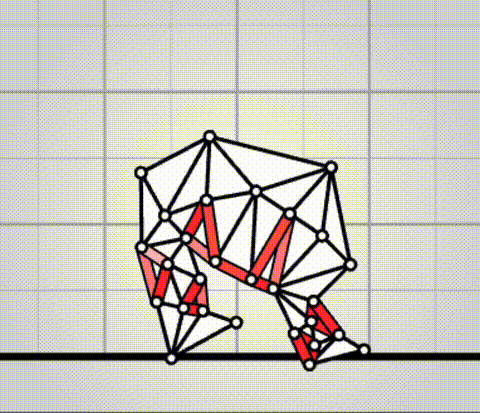It doesn't need to be a bipedal robot. We can let Boston Dynamics worry about that walking balance crap.
It could very well instead be on wheels like arm on tracks.
Or something more like a factory with arms on rails as per:
- Transcendence (2014)
- youtu.be/MtVvzJIhTmc?t=112 from Video "Rotrics DexArm is available NOW! by Rotrics (2020)" where they have a sliding rail
Algovivo demo
. github.com/juniorrojas/algovivo: A JavaScript + WebAssembly implementation of an energy-based formulation for soft-bodied virtual creatures.Although Ciro Santilli is a bit past their era, there's an aura of technical excellence about those people. It just seems that they sucked at business. Those open source hippies. Erm, wait.
Bibliography:
- archive.org/details/sunburstascentof00hall Sunburst: the ascent of Sun Microsystems by Mark Hall (1990)
Or in other words, it is basically implementing an operating system/firmware yourself ad hoc, together with your actual program.
From a technical point of view, it can do anything that Microsoft Windows can. Except being forcefully installed on every non-MacOS 2019 computer you can buy.
Ciro Santilli's conversion to Linux happened around 2012, and was a central part of Ciro Santilli's Open Source Enlightenment, since it fundamentally enables the discovery and contribution to open source software. Because what awesome open source person would waste time porting their amazing projects to closed source OSes?
Linux should track glibc and POSIX command line utilities in-tree like BSD Operating System, otherwise people have no way to get the thing running in the first place without blobs or large out-of-tree scripts! Another enlightened soul who agrees.
Particularly interesting in the history of Linux is how it won out over the open competitors that were coming up in the time: MINIX (see the chat) and BSD Operating System that got legally bogged down at the critical growth moment.
You must watch this: truth Happens advertisement by Red Hat.
xkcd 619: Supported Features
. Source. This perfectly illustrates Linux development. First features that matter. Then useless features.Bill Gates vs Steve Jobs by Epic Rap Battles of History (2012)
Source. Just stop whatever you are doing, and watch this right now. "I'm on Linux, bitch, I thought you GNU". Fandom explanations. It is just a shame that the Bill Gates actor looks absolutely nothing like the real gates. Actually, the entire Gates/Jobs parts are good, but not genial. But the Linux one is.How to decide if an ORM is decent? Just try to replicate every SQL query from nodejs/sequelize/raw/many_to_many.js on PostgreSQL and SQLite.
There is only a very finite number of possible reasonable queries on a two table many to many relationship with a join table. A decent ORM has to be able to do them all.
If it can do all those queries, then the ORM can actually do a good subset of SQL and is decent. If not, it can't, and this will make you suffer. E.g. Sequelize v5 is such an ORM that makes you suffer.
The next thing to check are transactions.
Basically, all of those come up if you try to implement a blog hello world world such as gothinkster/realworld correctly, i.e. without unnecessary inefficiencies due to your ORM on top of underlying SQL, and dealing with concurrency.
Ciro Santilli's jaw dropped when he learned about this concept. A Small Talent for War, are you sure?
Some of the most notable ones:
- 1942: Chicago Pile-1: the first human-made nuclear chain reaction.
- 1943: X-10 Graphite Reactor: an intermediate step between the nuclear chain reaction prototype Chicago Pile-1 and the full blown mass production at Hanford site. Located in the Oak Ridge National Laboratory.
- 1944: B Reactor at the Hanford site produced the plutonium used for Trinity and Fat Man
Nerds 2.0.1 excerpt about Cisco (1998)
Source. - youtu.be/mhz24AR3nIc?t=45 the founders both worked at Stanford University but because they were in different departments they couldn't send an email to one another.
- youtu.be/mhz24AR3nIc?t=54 Sandy Lerner is very nice and chilled. She says how she was amazed by Leonard's manners!
- youtu.be/mhz24AR3nIc?t=86 "sincerity begins at a little over 100 hours a week". The dude is a robot.
- youtu.be/mhz24AR3nIc?t=279 earthquake!!!
- youtu.be/d0ya8DggDYs?list=PLn7AqqWS1I_9EHEHy6sw-v6hUMhbeOTRW&t=3268 she bought a manor house, probably in Chawton Hampshire, England, possibly Chawton House
- youtu.be/d0ya8DggDYs?list=PLn7AqqWS1I_9EHEHy6sw-v6hUMhbeOTRW&t=3312 he started donating to search for extraterrestrial intelligence
A report on the Navier-Stokes Problem by Vladimir Šverak
. Source. 2025.The cause of variable number tandem repeat.
These can be used to break cells apart from tissue, and also break up larger DNA or RNA molecules into smaller ones, suitable for sequencing.
There are unlisted articles, also show them or only show them.

